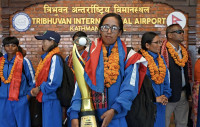Opinion
Testing times
General view is if late-night mugging can lead to a good performance, other performances become immaterial
Deepak Thapa
The annual ritual of the SLC exams is with us again and everyone is affected by it since loadshedding hours have been reduced a wee bit giving us some relief from the long, dark hours and enabling students for some last-minute catching up. More than half a million households across the country are waiting with bated breath as someone in their family tries to get through an examination that is seen as key to entering the world of higher education and everything that comes with it.
And, of course, from this year on, no one is going to ‘fail’ the SLC exams. All the 615,553 students appearing for the exam will be given letter grades to signify their grasp of the subjects. There have been plenty of discussions and debates on the merit of the system being introduced at this juncture. One persistent criticism has been that it has been done without proper planning. If so, and there is no reason to believe otherwise, as with many things in Nepal, all these students are being asked to take part in an experiment, the outcome of which is not quite clear.
It beats reason why this should be so since it has been obvious from various government reports dating back to the early 2000s that letter grades would replace marks while assessing students’ performance. And, unlike the one-shot SLC to determine someone’s proficiency in any subject, it would be based on ongoing evaluation year after year.
The general understanding continues to be that if some late-night mugging can lead to a good performance in SLC, both past and future performances become immaterial. Even the fact that loadshedding was reduced by an hour during the SLC exams buttresses that point. And, with good reason, too, since all that the authorities are going to do is convert marks obtained through the traditional evaluation system into grades from A+ down to E.
There also seems to be a disconnect between all the academic reasons for why the new system has been put in place and what has sometimes come out in the public domain. When first introduced last year for the technical and vocations streams of the SLC, the Executive Director of the Curriculum Development Centre was reported as saying that the primary reason for introducing the letter grade system was to do away with the concepts of ‘pass’ and ‘fail’, presumably in order to avoid stigmatising those who come up short in the examination. Admirable as the attempt may be, it hardly does anything to improve the quality of the students who get through the SLC.
Not so different
In an article a few days ago, researchers Pramod Bhatta and Sudip Nakarmi provided an analysis of what the SLC has attempted to assess so far. Using Benjamin Bloom’s taxonomy of congnitive domains that consist of (going from the simple to the complex) knowledge, comprehension, application, analysis, synthesis, and evaluation, they looked at the questions asked over the past seven years in the seven SLC compulsory subjects of Nepali, English, Social Studies, Science, Mathematics, and Health, Population and Environment. Their finding was that the SLC required a high degree of memorisation, with questions testing recall power comprising between 52 and 65 percent in various subjects. Their conclusion, sadly unsurprising, was that the SLC best trains students for rote-learning and its corollary, regurgitation.
The 2006 report, ‘Study on Student Performance in SLC’, authored by a team led by the former Tribhuvan University Vice-Chancellor, Kedar Bhakta Mathema, noted of the process of providing letter grades: ‘Attempts are made to demonstrate relationship between Grades and achievement with the help of descriptors that define precisely what a student with a particular Grade has achieved or has not. This system treats the learning process as a continuum with no terminal point.’
There is hardly any chance that the question papers this year were any different, particularly if the whole exercise will result in a simple conversion of marks to grades. Hence, the intention behind the introduction of a more advanced form of evaluation has been completely undermined, with the SLC certificate continuing to be the one and only end-all.
Striking teachers
Enough has been said and written about the politicisation of education, and all that goes with it such as the incompetence of teachers, their absenteeism, and even prejudice against groups such as Dalits. To give one recent but disturbing example, on the day before the SLC exams began, the newspaper My Republica had a story that said all the teachers, including the headmaster, from a school in Dang had refused to take up the responsibility of serving as the Superintendent of the examination centre based in their school. The reason was that they were under pressure from teachers’ unions and political parties to not do so. That was not because the unions and political parties felt that those teachers were morally depraved and, hence, unfit to supervise the SLC exams but because the union and party bosses wanted their cronies to be in charge so that, as the report said, they could ‘help certain students or group of students to get better score in the SLC exams by hook or crook’.
If that is what teachers’ unions and willing accomplices of teachers are capable of, one wonders about the kind of education they are imparting in school to begin with. But, one also wonders about the thousands of upright teachers who do a decent job of getting students through one level to the next, and nothing else. How many of these are teachers their students will remember decades afterwards?
This brings me to a lecture given by astrophysicist Neil deGrasse Tyson, a well-known advocate of science education, besides the many other accomplishments he has had. Speaking at a college in the US (accessible thanks to YouTube), he asked the audience, of the scores and even hundreds of teachers they may have had, ‘How many teachers in your entire life have had a singular influence on who and what you became? How many teachers truly influenced you?’
Tyson asks people for a show of hands asking if they can think of one such teacher, then two teachers, then three, then four. By then, he reports that about three quarters of the audience have been covered. By the time he reaches six teachers, all hands have been raised. Tyson believes that these teachers are remembered not ‘because they gave an awesome exam or because their problem sets were fun. You remember these teachers because you felt their enthusiasm.’
From my own experience, I could not think of enough teachers to cover one hand, and having myself worked as a school teacher, I do wonder how well I would do in the estimation of my own students. But it did get me thinking: Isn’t that the kind of teacher you would want for the letter grade system to truly work? In fact, infection of enthusiasm for any subject would make all kinds of assessments rather redundant.




 15.12°C Kathmandu
15.12°C Kathmandu










